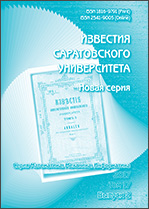|
This article is cited in 1 scientific paper (total in 1 paper)
Scientific Part
Mathematics
Generalized absolute convergence of series with respect to multiplicative systems of functions of generalized bounded variation
M. A. Kuznetsova
Saratov State University, 83, Astrakhanskaya Str., Saratov, Russia, 410012
Abstract:
A. Zygmund proved that a $2\pi$-periodic function with bounded variation and from any Lipschitz class $Lip(\alpha)$ has absolutely convergent Fourier series. This result was extended to many classes of functions of generalized bounded variation (for example, functions of bounded Jordan–Wiener $p$-variation, functions of bounded $\Lambda$-variation introduced by D. Waterman et al) and to different spaces defined with the help of moduli of continuity. We study the convergence of series $\sum\limits^\infty_{k=1}\gamma_k|\hat{f}(k)|^\beta$, where $\{\gamma_k\}^\infty_{k=1}$ is a sequence from appropriate Gogoladze–Meskhia class, while $\{\hat{f}(k)\}_{k=0}^\infty$ are Fourier coefficients of $f\in L^1[0,1)$ with respect to a multiplicative system. The sufficient conditions for convergence of these series are obtained under assertion of boundedness of generalized fluctuation determined by a number $p\geq 1$ and sequence $\Lambda$ and in terms of uniform or integral moduli of continuity. By using fluctuation (i.e. the oscillations of a function are considered only with respect to the restricted class of partitions and its intervals) instead of variation we obtain more general assertions. The results of the present paper give an analogue or generalize some results of R. G. Vyas concerning trigonometric or Walsh series.
Key words:
absolute convergence, series with respect to multiplicative systems, functions of generalized bounded variation.
Citation:
M. A. Kuznetsova, “Generalized absolute convergence of series with respect to multiplicative systems of functions of generalized bounded variation”, Izv. Saratov Univ. Math. Mech. Inform., 17:3 (2017), 304–312
Linking options:
https://www.mathnet.ru/eng/isu726 https://www.mathnet.ru/eng/isu/v17/i3/p304
|

|




 Contact us:
Contact us: Terms of Use
Terms of Use
 Registration to the website
Registration to the website Logotypes
Logotypes








 Citation in format
Citation in format 
